高中英语中的省略现象
- 格式:doc
- 大小:24.50 KB
- 文档页数:1
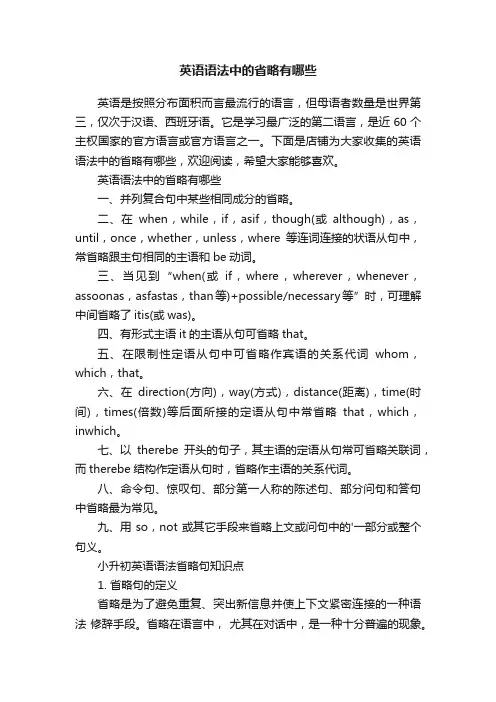
英语语法中的省略有哪些英语是按照分布面积而言最流行的语言,但母语者数量是世界第三,仅次于汉语、西班牙语。
它是学习最广泛的第二语言,是近60个主权国家的官方语言或官方语言之一。
下面是店铺为大家收集的英语语法中的省略有哪些,欢迎阅读,希望大家能够喜欢。
英语语法中的省略有哪些一、并列复合句中某些相同成分的省略。
二、在when,while,if,asif,though(或although),as,until,once,whether,unless,where等连词连接的状语从句中,常省略跟主句相同的主语和be动词。
三、当见到“when(或if,where,wherever,whenever,assoonas,asfastas,than等)+possible/necessary等”时,可理解中间省略了itis(或was)。
四、有形式主语it的主语从句可省略that。
五、在限制性定语从句中可省略作宾语的关系代词whom,which,that。
六、在direction(方向),way(方式),distance(距离),time(时间),times(倍数)等后面所接的定语从句中常省略that,which,inwhich。
七、以therebe开头的句子,其主语的定语从句常可省略关联词,而therebe结构作定语从句时,省略作主语的关系代词。
八、命令句、惊叹句、部分第一人称的陈述句、部分问句和答句中省略最为常见。
九、用so,not或其它手段来省略上文或问句中的'一部分或整个句义。
小升初英语语法省略句知识点1. 省略句的定义省略是为了避免重复、突出新信息并使上下文紧密连接的一种语法修辞手段。
省略在语言中,尤其在对话中,是一种十分普遍的现象。
2.小品词的省略1)省略介词I ‘ ve studied English (for) five years. 我已学五年英语了。
2)省略连词thatI believe (that) you will succeed . 我相信你们会成功的。
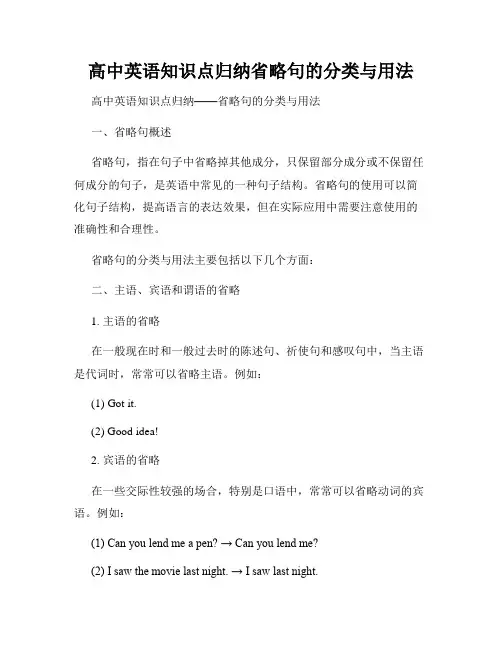
高中英语知识点归纳省略句的分类与用法高中英语知识点归纳——省略句的分类与用法一、省略句概述省略句,指在句子中省略掉其他成分,只保留部分成分或不保留任何成分的句子,是英语中常见的一种句子结构。
省略句的使用可以简化句子结构,提高语言的表达效果,但在实际应用中需要注意使用的准确性和合理性。
省略句的分类与用法主要包括以下几个方面:二、主语、宾语和谓语的省略1. 主语的省略在一般现在时和一般过去时的陈述句、祈使句和感叹句中,当主语是代词时,常常可以省略主语。
例如:(1) Got it.(2) Good idea!2. 宾语的省略在一些交际性较强的场合,特别是口语中,常常可以省略动词的宾语。
例如:(1) Can you lend me a pen? → Can you lend me?(2) I saw the movie last night. → I saw last night.3. 谓语的省略在上下文已经明确的情况下,可以省略谓语动词。
例如:(1) Have you finished your homework? → Yes, I have.(2) I didn't see you at the party. → No, I didn't.三、定语和状语的省略1. 定语的省略当被修饰语已经被前面提及或上下文中明确时,可以省略定语从句中的关系代词或连词。
例如:(1) The book that I borrowed from the library is very interesting. → The book I borrowed from the library is very interesting.(2) The girl who is wearing a r ed dress is my sister. → The girl wearinga red dress is my sister.2. 状语的省略在某些情况下,可以省略状语从句或状语从句中的一些成分。
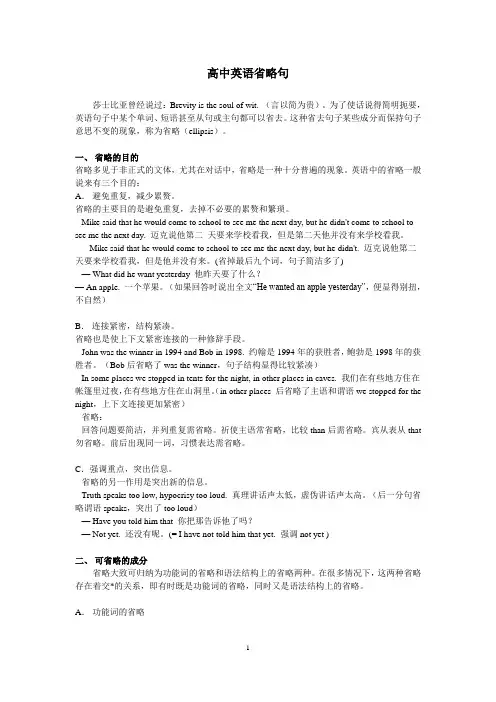
高中英语省略句莎士比亚曾经说过:Brevity is the soul of wit. (言以简为贵)。
为了使话说得简明扼要,英语句子中某个单词、短语甚至从句或主句都可以省去。
这种省去句子某些成分而保持句子意思不变的现象,称为省略(ellipsis)。
一、省略的目的省略多见于非正式的文体,尤其在对话中,省略是一种十分普遍的现象。
英语中的省略一般说来有三个目的:A.避免重复,减少累赘。
省略的主要目的是避免重复,去掉不必要的累赘和繁琐。
Mike said that he would come to school to see me the next day, but he didn't come to school to see me the next day. 迈克说他第二天要来学校看我,但是第二天他并没有来学校看我。
-- Mike said that he would come to school to see me the next day, but he didn't. 迈克说他第二天要来学校看我,但是他并没有来。
(省掉最后九个词,句子简洁多了)— What did he want yesterday 他昨天要了什么?— An apple. 一个苹果。
(如果回答时说出全文“He wanted an apple yesterday”,便显得别扭,不自然)B.连接紧密,结构紧凑。
省略也是使上下文紧密连接的一种修辞手段。
John was the winner in 1994 and Bob in 1998. 约翰是1994年的获胜者,鲍勃是1998年的获胜者。
(Bob后省略了was the winner,句子结构显得比较紧凑)In some places we stopped in tents for the night, in other places in caves. 我们在有些地方住在帐篷里过夜,在有些地方住在山洞里。
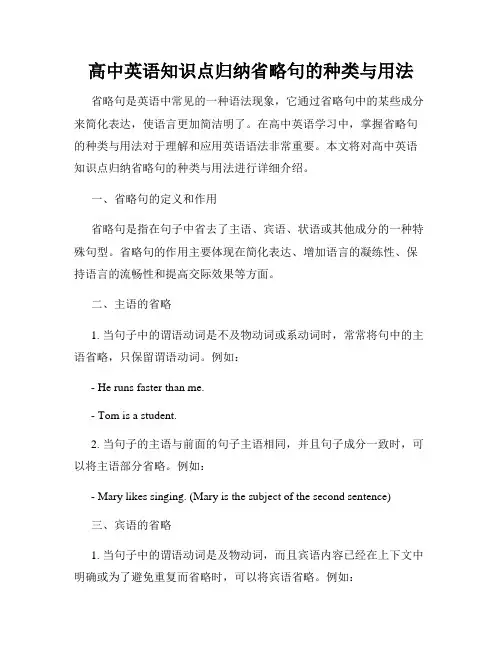
高中英语知识点归纳省略句的种类与用法省略句是英语中常见的一种语法现象,它通过省略句中的某些成分来简化表达,使语言更加简洁明了。
在高中英语学习中,掌握省略句的种类与用法对于理解和应用英语语法非常重要。
本文将对高中英语知识点归纳省略句的种类与用法进行详细介绍。
一、省略句的定义和作用省略句是指在句子中省去了主语、宾语、状语或其他成分的一种特殊句型。
省略句的作用主要体现在简化表达、增加语言的凝练性、保持语言的流畅性和提高交际效果等方面。
二、主语的省略1. 当句子中的谓语动词是不及物动词或系动词时,常常将句中的主语省略,只保留谓语动词。
例如:- He runs faster than me.- Tom is a student.2. 当句子的主语与前面的句子主语相同,并且句子成分一致时,可以将主语部分省略。
例如:- Mary likes singing. (Mary is the subject of the second sentence)三、宾语的省略1. 当句子中的谓语动词是及物动词,而且宾语内容已经在上下文中明确或为了避免重复而省略时,可以将宾语省略。
例如:- Can you speak French? Yes, I can. (French is the object of speak)四、状语的省略1. 当句子中的状语从句与主句的主语或宾语一致时,可以将状语从句中的主语或宾语省略。
例如:- He speaks English better than I (do). (I is the subject of do)- She likes swimming more than her sister (does). (Her sister is the subject of does)2. 当句子中的状语从句与主句的谓语动词一致时,可以将状语从句中的谓语动词省略。
例如:- I work harder than you (do). (Do is the verb of the subordinate clause)五、被动语态的省略1. 当句子中的被动语态中的被动助动词和be动词前面有介词时,可以将be动词和介词省略。
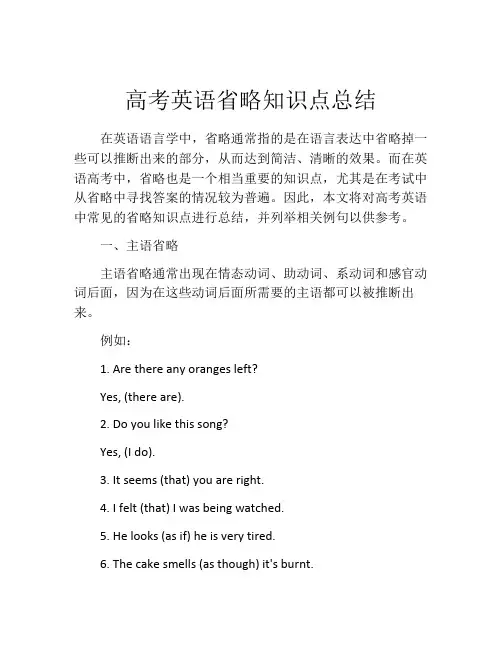
高考英语省略知识点总结在英语语言学中,省略通常指的是在语言表达中省略掉一些可以推断出来的部分,从而达到简洁、清晰的效果。
而在英语高考中,省略也是一个相当重要的知识点,尤其是在考试中从省略中寻找答案的情况较为普遍。
因此,本文将对高考英语中常见的省略知识点进行总结,并列举相关例句以供参考。
一、主语省略主语省略通常出现在情态动词、助动词、系动词和感官动词后面,因为在这些动词后面所需要的主语都可以被推断出来。
例如:1. Are there any oranges left?Yes, (there are).2. Do you like this song?Yes, (I do).3. It seems (that) you are right.4. I felt (that) I was being watched.5. He looks (as if) he is very tired.6. The cake smells (as though) it's burnt.二、宾语省略宾语省略通常出现在动宾结构中,即有一个及物动词和需要一个宾语的情况下,这个宾语可以被省略掉。
例如:1. He enjoys (playing) basketball.2. Would you like (some) tea?3. They considered (him) to be the best candidate.4. I saw (a man) run across the road.三、介词省略介词省略通常指省略掉可以在上下文中推断出来的介词。
此外,在固定短语中,常用的介词也可以被省略掉。
例如:1. I am (going) to the supermarket.2. She arrived (at) the airport at 2 p.m.3. He excels (in) mathematics.4. I'm interested (in) Chinese culture.四、代词省略代词省略通常出现在上下文中出现了相应的代词的情况下,可以省略掉相应的代词。
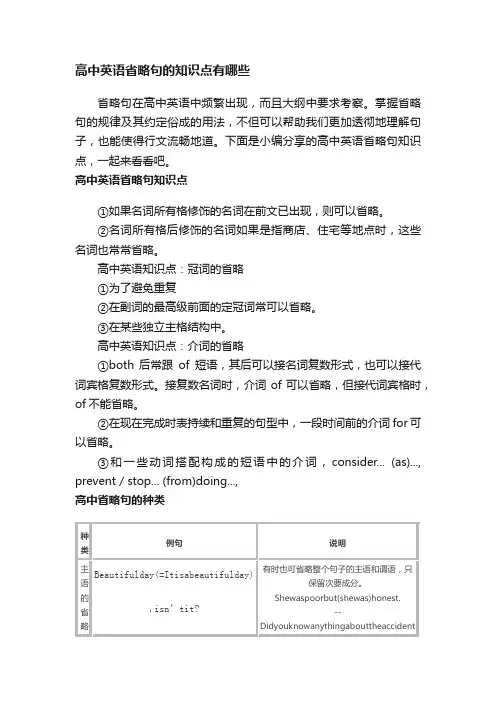
高中英语省略句的知识点有哪些省略句在高中英语中频繁出现,而且大纲中要求考察。
掌握省略句的规律及其约定俗成的用法,不但可以帮助我们更加透彻地理解句子,也能使得行文流畅地道。
下面是小编分享的高中英语省略句知识点,一起来看看吧。
高中英语省略句知识点①如果名词所有格修饰的名词在前文已出现,则可以省略。
②名词所有格后修饰的名词如果是指商店、住宅等地点时,这些名词也常常省略。
高中英语知识点:冠词的省略①为了避免重复②在副词的最高级前面的定冠词常可以省略。
③在某些独立主格结构中。
高中英语知识点:介词的省略①both 后常跟of短语,其后可以接名词复数形式,也可以接代词宾格复数形式。
接复数名词时,介词of可以省略,但接代词宾格时,of不能省略。
②在现在完成时表持续和重复的句型中,一段时间前的介词for可以省略。
③和一些动词搭配构成的短语中的介词,consider... (as)..., prevent / stop... (from)doing...,高中省略句的种类种类例句说明主语的省略Beautifulday(=Itisabeautifulday),isn’tit?有时也可省略整个句子的主语和谓语,只保留次要成分。
Shewaspoorbut(shewas)honest.--Didyouknowanythingabouttheaccident种类例句说明Pitywelivesofarfromthesea.(Itisapitywelivesofarfromthesea.)谓语的省略--whatdoyouthinkmadeMarysoupset?--Losinghernewbicycle(madeMarysoupset).--Notuntilyoutoldme.(=Ididn’tknowanythingaboutituntilyoutoldme.)状语从句的省略Seenfromtheplane(whenitisseenfromtheplane),thehouselooksliketinytoys.If(itis)possible,I’llgotherewithyou.注意状语从句中的主语同主句主语的一致性。
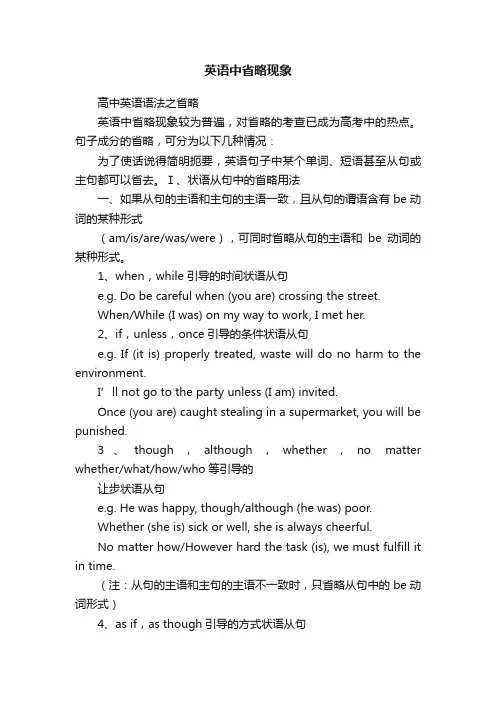
英语中省略现象高中英语语法之省略英语中省略现象较为普遍,对省略的考查已成为高考中的热点。
句子成分的省略,可分为以下几种情况:为了使话说得简明扼要,英语句子中某个单词、短语甚至从句或主句都可以省去。
Ⅰ、状语从句中的省略用法一、如果从句的主语和主句的主语一致,且从句的谓语含有be动词的某种形式(am/is/are/was/were),可同时省略从句的主语和be动词的某种形式。
1、when,while引导的时间状语从句e.g. Do be careful when (you are) crossing the street.When/While (I was) on my way to work, I met her.2、if,unless,once引导的条件状语从句e.g. If (it is) properly treated, waste will do no harm to the environment.I’ll not go to the party unless (I am) invited.Once (you are) caught stealing in a supermarket, you will be punished.3、though,although,whether,no matter whether/what/how/who等引导的让步状语从句e.g. He was happy, though/although (he was) poor.Whether (she is) sick or well, she is always cheerful.No matter how/However hard the task (is), we must fulfill it in time.(注:从句的主语和主句的主语不一致时,只省略从句中的be动词形式)4、as if,as though引导的方式状语从句e.g. He rubbed his eyes and yawned as if/though (he was) waking up after along sleep.He stood up as if/though (he wanted) to leave.(as if/though + to do表示一个将来的动作)二、than,as引导的比较状语从句中的省略用法:当不同的主语进行比较时,一般省略从句中的谓语;当从句中的主语与谓语(be动词除外)和主句中的主语与谓语相同时,通常省略从句中的主语和谓语,只保留比较部分。
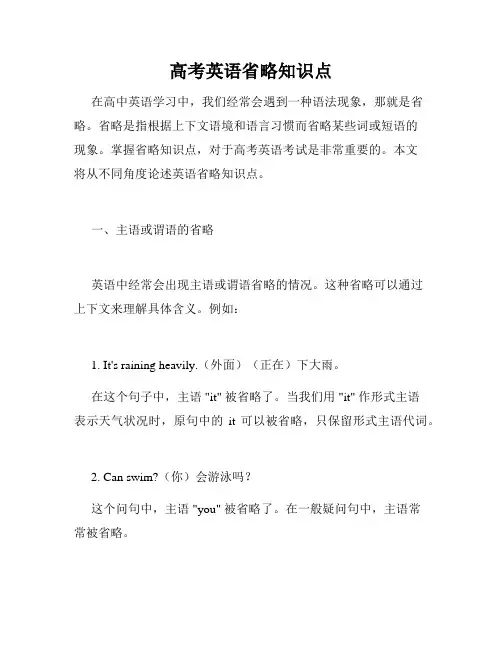
高考英语省略知识点在高中英语学习中,我们经常会遇到一种语法现象,那就是省略。
省略是指根据上下文语境和语言习惯而省略某些词或短语的现象。
掌握省略知识点,对于高考英语考试是非常重要的。
本文将从不同角度论述英语省略知识点。
一、主语或谓语的省略英语中经常会出现主语或谓语省略的情况。
这种省略可以通过上下文来理解具体含义。
例如:1. It's raining heavily.(外面)(正在)下大雨。
在这个句子中,主语 "it" 被省略了。
当我们用 "it" 作形式主语表示天气状况时,原句中的it 可以被省略,只保留形式主语代词。
2. Can swim?(你)会游泳吗?这个问句中,主语 "you" 被省略了。
在一般疑问句中,主语常常被省略。
3. Coming!(我正在)来了!这个句子中,谓语 "am" 被省略了。
在表示将来的动作时,主语 "I" 的 "am" 可以省略。
二、宾语的省略在某些情况下,宾语可以被省略掉。
这种省略通常出现在某些固定句型中,常要根据上下文来理解。
例如:1. Can you pass (me) the salt?这个句子中,宾语 "me" 被省略了。
在交际用语中,表示请求或指示对方给予自己某物时,宾语往往被省略。
2. Let's go (to) the park.这个句子中,宾语 "to" 被省略了。
在 go, come, return, fly, drive 等表示“去”或“来”的动词后,表示地点的宾语常被省略。
三、连词的省略有时候,连词也可以被省略。
这种省略常见于并列连词和条件连词。
例如:1. You can have either apples (or) oranges.这个句子中,连词 "or" 被省略了。
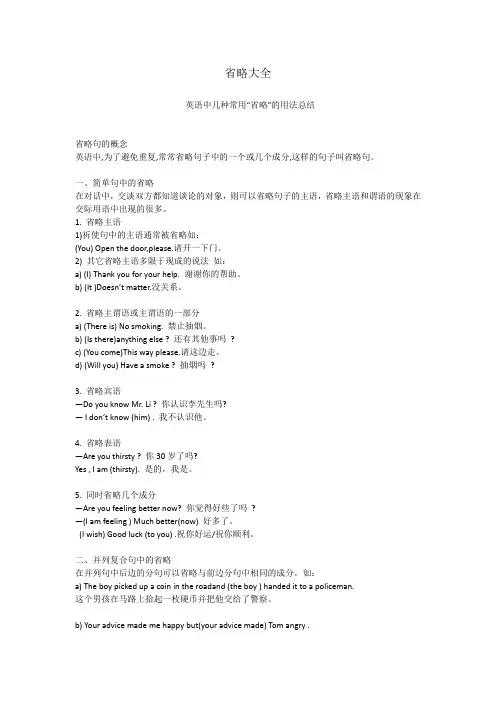
省略大全英语中几种常用“省略”的用法总结省略句的概念英语中,为了避免重复,常常省略句子中的一个或几个成分,这样的句子叫省略句。
一、简单句中的省略在对话中,交谈双方都知道谈论的对象,则可以省略句子的主语,省略主语和谓语的现象在交际用语中出现的很多。
1. 省略主语1)祈使句中的主语通常被省略如:(You) Open the door,please.请开一下门。
2) 其它省略主语多限于现成的说法如:a) (I) Thank you for your help. 谢谢你的帮助。
b) (It )Doesn’t matter.没关系。
2. 省略主谓语或主谓语的一部分a) (There is) No smoking. 禁止抽烟。
b) (Is there)anything else ? 还有其他事吗?c) (You come)This way please.请这边走。
d) (Will you) Have a smoke ? 抽烟吗?3. 省略宾语—Do you know Mr. Li ? 你认识李先生吗?— I don’t know (him) . 我不认识他。
4. 省略表语—Are you thirsty ? 你30岁了吗?Yes , I am (thirsty). 是的,我是。
5. 同时省略几个成分—Are you feeling better now? 你觉得好些了吗?—(I am feeling ) Much better(now) 好多了。
(I wish) Good luck (to you) .祝你好运/祝你顺利。
二、并列复合句中的省略在并列句中后边的分句可以省略与前边分句中相同的成分。
如:a) The boy picked up a coin in the roadand (the boy ) handed it to a policeman.这个男孩在马路上拾起一枚硬币并把他交给了警察。
b) Your advice made me happy but(your advice made) Tom angry .你的建议使我高兴但使汤姆生气。
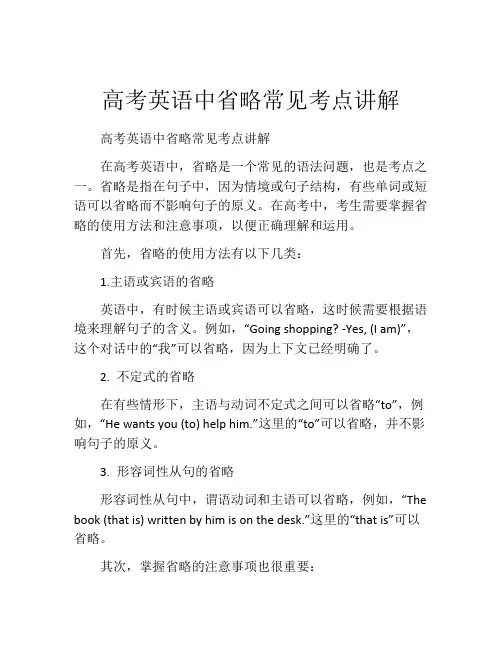
高考英语中省略常见考点讲解高考英语中省略常见考点讲解在高考英语中,省略是一个常见的语法问题,也是考点之一。
省略是指在句子中,因为情境或句子结构,有些单词或短语可以省略而不影响句子的原义。
在高考中,考生需要掌握省略的使用方法和注意事项,以便正确理解和运用。
首先,省略的使用方法有以下几类:1.主语或宾语的省略英语中,有时候主语或宾语可以省略,这时候需要根据语境来理解句子的含义。
例如,“Going shopping? -Yes, (I am)”,这个对话中的“我”可以省略,因为上下文已经明确了。
2. 不定式的省略在有些情形下,主语与动词不定式之间可以省略“to”,例如,“He wants you (to) help him.”这里的“to”可以省略,并不影响句子的原义。
3. 形容词性从句的省略形容词性从句中,谓语动词和主语可以省略,例如,“The book (that is) written by him is on the desk.”这里的“that is”可以省略。
其次,掌握省略的注意事项也很重要:1.根据上下文理解在高考英语中,出现省略的句子往往需要依靠上下文来理解,考生需要仔细阅读上下文,避免对省略造成误解。
2. 不定式的省略最常用在省略中,不定式的省略是最常见的,考生需要掌握不定式的使用方法,才能正确理解和运用省略。
3. 注意省略对句子成分的影响在句子中出现的省略,会影响到句子的成分和语法结构,考生需要仔细分析和理解涉及到的语法问题。
综上所述,省略是高考英语中的一个常见考点,考生需要掌握省略的使用方法和注意事项,以便正确理解和运用。
在备考中,可以通过大量练习和查阅相关资料来提高自己的掌握程度,避免省略造成的误解和错误。
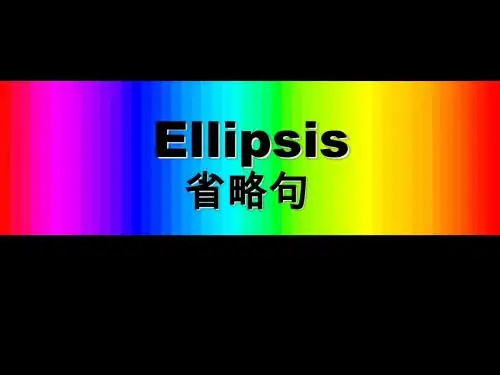
【高中英语】高中英语省略和倒装语法知识点1.简单句中的省略1.语境中省略(1)陈述句中在驳斥的助动词前,并作主语的人称代词可以省略。
例如:couldn’tunderstandwhathewanted.我稀奇古怪他想什么。
(2)但在肯定陈述句中,have,be,will前作主语的人称代词不可以省略。
如: iwillseeyousoon.我很快去看你。
其他情况则不受限制。
例如:hopetohearfromyousoon.期望很快接到你的信。
(3)疑问句中省略主语的人称代词和助动词。
如:(haveyou)hadagoodtime?你玩得高兴吗?(4)句首的therebe和itis的省略。
例如:(there’s)nobodyathome.家里没有人。
(isthere)anythingthematter?存有紧要事吗?(5)动词的省略。
如:恳请跑这边。
2.重复的省略动词不定式的省略,只留存不定式符号。
例如:iwenttherebecauseiwantedto.我回去那儿是因为我想要回去。
说明:①动词不定式的省略通常发生在动词like,love,hope,need,try,wish,want等动词之后。
例如:didyouseethepyramids?你看看金字塔了吗?no,iwantedto(seethem)buttherewasn'ttime.没有回去。
我想要回去看看,但没有时间。
②在助动词haveto,oughtto,usedto,beableto和begoingto之后的动词不定式可以省略。
如:doyoudoyourownhousework?你做家务吗?iusedto,butnowi'vegotaserviceflat.过去常常做,但是现在我有公寓服务了。
③有时形容词或名词后的整个动词不定式(和动词原形)一起省略。
如:我说实话,但我没时间去。
④w ant和wouldlike后的不定式省略后常要保留to,但在从句中却常常省略。
高中英语语法_省略高中英语语法:省略现象解析在英语语法中,省略是一种常见的语言现象。
它指的是在某些语境中,一些语言成分可以省略,而不会影响句子的完整性和理解。
省略现象主要出现在句子、从句或介词短语中。
本文将通过分析省略现象,帮助高中生更好地掌握英语语法。
一、句子的省略在英语中,省略句子成分是很常见的。
以下是一些常见的省略句子成分的情况:1、省略主语在某些情况下,句子可以省略主语,而不会影响句子的意思。
例如:(1)Sorry, I can't come. (我无法来。
)(2)Open the door, please. (请开门。
)2、省略谓语在一些简单句或祈使句中,谓语动词经常被省略。
例如:(1)Wash your hands before meals. (饭前要洗手。
)(2)Pick up the book on the floor. (把地上的书捡起来。
)3、省略宾语在一些简单句中,宾语可以省略。
例如:(1)She wants to buy a new dress. (她想买个新裙子。
)(2)I like eating fruits. (我喜欢吃水果。
)二、从句的省略在英语中,从句的省略现象也很常见。
以下是一些常见的从句省略情况:1、省略主语和谓语在定语从句中,如果主语和谓语与先行词一致,可以省略它们。
例如:(1)The man who is standing under the tree is my brother. (站在树下的那个男人是我的哥哥。
)(2)The book that you lent me is very interesting. (你借给我的那本书很有趣。
)2、省略作主语的代词和be动词在由that引导的定语从句中,作主语的代词和be动词通常可以省略。
例如:(1)The child (that) I taught is now a doctor. (我教过的那个孩子现在是一名医生。
高中英语知识点归纳省略句的特殊情况与应用高中英语知识点归纳:省略句的特殊情况与应用一、省略句的基本概念在英语句子中,为了避免重复,有时可以省略某些成分,这种现象称为省略句。
省略句在口语和书面语中广泛使用,掌握省略句的特殊情况和应用能够提高语言表达的简洁性和流畅性。
二、省略句的常见情况1. 主语的省略在上下文明确的情况下,主语可以被省略。
例:(1)— Who is playing basketball?— Tom is.(2)He is good at playing basketball, and so is his sister.2. 谓语的省略当句子的主语已经在前面提到时,谓语可以被省略。
例:(1)I like to play tennis, and she does too.(2)Mike studies hard, and his brother does as well.3. 宾语的省略当句子的宾语已经在前面提到时,宾语可以被省略。
例:(1)— Have you finished your homework?— Yes, I have.(2)Tom is reading a book, and Mary is too.4. 定语的省略在某些情况下,定语可以被省略,特别是针对被修饰成分为人或物时。
例:(1)I bought some apples and ate them.(2)The flowers in the garden are beautiful, and those in the house are also lovely.5. 状语的省略在上下文中,有些状语可以被省略。
例:(1)I go to school by bus, and so does my brother.(2)She works hard, and sometimes I do too.6. 句子成分的省略在对话或长篇文章中,为了避免重复,可以省略前面出现过的句子成分。
高中英语知识点归纳非谓语动词的省略高中英语知识点归纳:非谓语动词的省略非谓语动词是英语语法中的重要部分,它可以在句子中充当名词、形容词或副词。
非谓语动词的省略现象广泛存在于英语语境中,掌握这一知识点对于理解和运用英语语法有着重要的作用。
本文将对高中英语中非谓语动词的省略现象进行归纳和总结。
一、不定式的省略不定式是非谓语动词的一种形式,通常由“to + 动词原形”构成。
在以下情况中,不定式可以被省略:1. 当不定式的逻辑主语与句子的主语一致时,可以将不定式省略。
例:Jack plans to go swimming this afternoon, and I plan to (go swimming) too.2. 当句子主语与不定式所表达的动作的执行者一致时,可省略不定式的主动式。
例:He asked me to help, but I refused to (help).3. 当两个不定式所表示的动作相同,并且前一个不定式中含有动词“let”时,可以省略后一个不定式。
例:He let us stay at his house, or just go.4. 当句子主语与不定式所表达的动作的承受者一致时,可省略不定式的被动式。
例:He made me (be) his assistant, which was a great honor.二、动名词的省略动名词是以动词的-ing形式构成的名词,在某些情况下可以省略。
以下是一些常见的动名词省略的情况:1. 当动名词作主语时,可以省略动名词。
例:Smoking is harmful to health.→(To) smoke is harmful to health.2. 当动名词作宾语时,可以省略动名词。
例:I enjoy s wimming in summer. →I enjoy (swimming) in summer.3. 当动名词作表语时,可以省略动名词。
高中英语中的省略现象
甘肃省武威第七中学王忠文733006
省略,是英语中比较常见的一种语法现象,它是对句子中的一个或几个句子成分进行省略,以使得语句更加的简洁,概括,重点突出。
那么,在高中的英语中有哪些常见的省略现象呢?下面,笔者从以下几个方面进行阐述。
1.虚拟语气中的省略
在if引导的虚拟条件句中,若句子中有were; had; should时,可以将if 省略,把were; had; should提前,构成倒装。
Eg: If you had come here on time ,you would not have missed the chance.
省略为Had you come here on time ,you would not have missed the chance. 2.名词性从句中的省略
在由一个坚持(insist),两个命令(order,command),三个建议(advise, suggest,propose),四个要求(ask, demand ,require, request,)引导的宾语从句以及这些动词的同源名词引导的同位语从句,主语或表语从句,都要采用虚拟语气,而从句中的谓语动词都为should + v, should 可以省略。
The teachers suggest that we (should) hand in homework on time .
3.状语从句中的省略
分词作状语的本质是状语从句的省略,是省略了主语及be 的相应变化形式的从句。
Eg:When (you are ) drinking to someone’s health , you raise your glass but do not touch .
4.定语从句中的省略
①关系代词的省略当先行词在从句中做宾语时,可以省略关系代词。
Eg: This is the factory (which/that) we visited last year.
②非谓语动词作后置定语的本质是省略了关系代词及be 的相应变化形式的
定语从句,相反,定语从句的被动语态,将来时,进行时都可以转化为相对应的非谓语动词作后置定语。
Eg: The man (who is)talking to with my father is a police .
5.不定式to 的省略
五看(watch,notice,observe,see,look),三使(make, have,let),二听(hear, listen),半帮助(help 即:help sb (to)do ),后接动词为省略to的动词的原形。
They noticed a thief climb the fence .
6.not 和 so 的省略
so及not 常用在hope, believe, think, say, suppose等动词之后,代替上文内容,避免重复。
Eg:--Go with me and have a taste ,ok?
-- I hope so .But I have another important thing to do .
以上是对高中英语中存在的部分重点的省略现象的简单总结,以期对同学们的学习能起到抛砖引玉的作用。